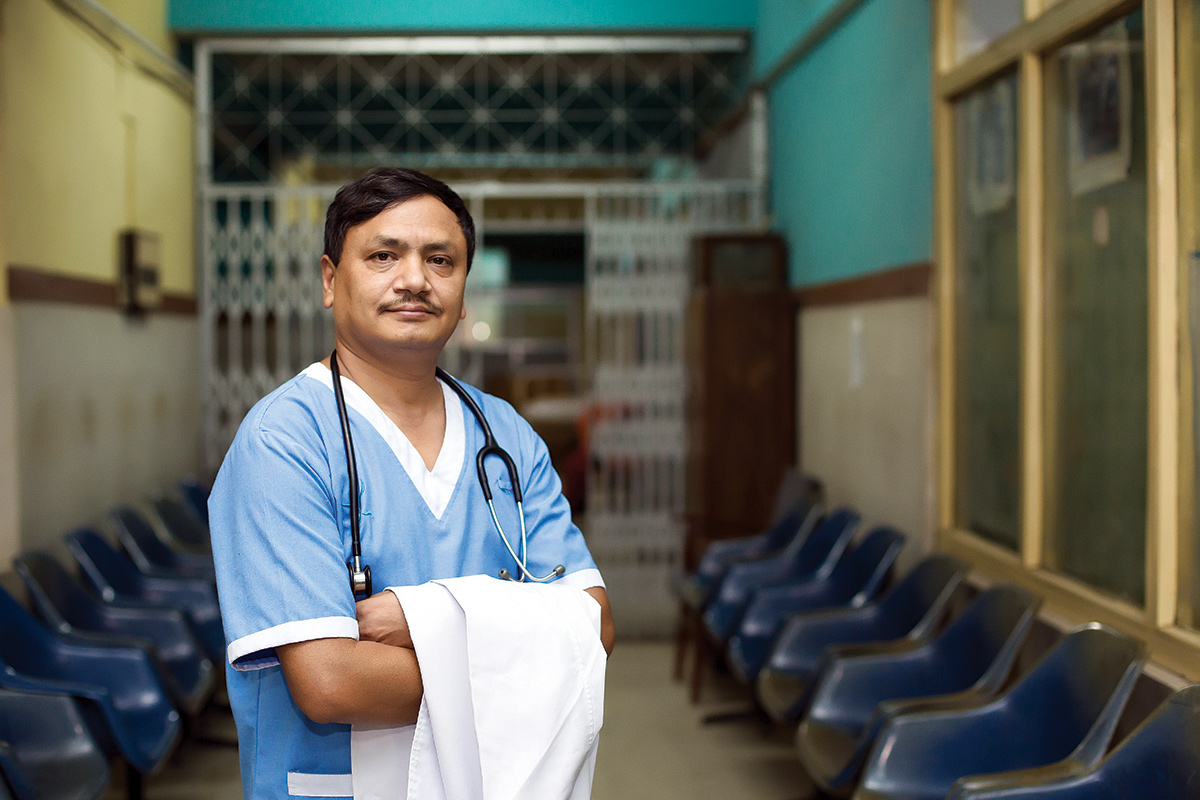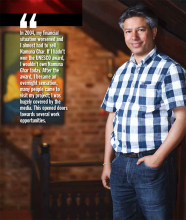
Dr Sudhamshu KC is an authority is his field of expertise. He has been associated with Ek Ek Paila since its birth. When a good friend Dr Suman Thapa called him a week after the mega earthquake to get united in providing healthcare in quake affected areas, he jumped right in. They decided on the modality of the services they were going to provide, and after 12 camps they knew that they must give continuity to their efforts by registering Ek Ek Paila. Dr KC shares that for him, Ek Ek Paila holds the same significance as that of a child born to a woman. And while it is a collective effort, it has become an important part of his life. His motivation comes from their common goal of reaching the unreached. He says feelingly, “When I think of people dying of minor illnesses without proper medical attention in remote places, it drives me crazy. It is the main reason that I want to take EEP to those places so that health literacy of the people can be increased and we can save lives”.
How do you define healthcare equity and how does it tie in with Ek Ek Paila’s vision?
I have been to almost 70 districts of the country and I know the health conditions of our people. We have all the facilities in the capital but many remote places lack basic healthcare facilities. People sometimes die of diarrheal disease which is not at all acceptable in the 21st century. We want to fill the gap. We try to connect with the health care providers of the place where we go. Previously it was telephone conversation that would help the doctor, thus the patients. Now we are trying to set up telemedicine centers and get connected 24X7. To start with, we have donated telemedicine equipment to Upper Dolpa.How can inequalities in healthcare be reduced in the country?
This is purely a local government’s job. We have three tiers of government now. If they start doing their job properly, these inequalities can soon be removed. We are trying from our part by providing basic health checkups in remote areas on a regular basis. Soon we are going to have two hospitals; one in Jajarkot and the other in Thokarpa, Sindhupalchowk. We will provide specialist service in these places on a regular basis. It will not only help the patients, but local doctors. We will be connected with them on a regular basis to provide services at their doorstep for which they would have to pay a huge cost if they have to travel to the cities.What are some of the transformative impacts you have seen with the work Ek Ek Paila is doing?
We are able to promote volunteerism. There are so many people willing to join us in our endeavor. The number of volunteers has increased. Similarly local philanthropy is also boosted. Nepalis from different parts of the globe have donated with open heart to continue our work. What challenges do doctors like yourself face dealing with vulnerable communities when confronted with a health crisis like Covid which perpetuated a failing health system? It’s purely the government’s failure to mobilise the healthcare workers to serve those communities. Wounded by local politics, the health care delivery system has failed badly. Moreover, the regulations are made in such a way that we, the non-government agencies, are not able to serve at our wish. This pandemic has taught us many things. If they learn the lessons and revise the policy, it may help us reach those who need the services most.How do you decide on EEP’s medical services?
The pandemic has turned everybody’s routine upside down and EEP is not an exception. Before the Corona pandemic we used to get requests from different places for comprehensive health camps. After discussion with members, the place is decided. The local stakeholder, health care center in the vicinity, weather of the place at that particular time, transportation mode are a few things that usually decide the camp. As we want to serve more people, we decide the venue six months prior so that proper advertisement of the camp can be made. We have very strong and dedicated members who are ready to go to every camp except in emergency. So, I don’t have much problem to decide the teams going to camp. However, if any member is not going it becomes his/her responsibility to send the replacement. So, every camp is like a mobile hospital. We also try to involve local doctors so that it is easy for us to refer the patients after certain treatment. So far there has been no crisis in getting doctors. Most of the time it’s the transport part that gives hiccups. There are not so many players who are willing to deposit a lot of cash at a casino site and this is normal. For such players who are willing to try slot machines with a low deposit experts from Fancasinos have prepared a list of NZ minimum deposit casinos. People may play at those casinos with $10 and obtain free spins.City clinic AT EEP
After monthly camp for one whole year after the mega earthquake, we decided for two camps in a year. We completed 19 pailas and Covid 19 put a brake to it. The city clinic is the 20th paila! Over the years, people from the rural areas of the country have migrated to Kathmandu city for an economically sustainable life. However, the high costs of living and lack of job opportunities have led people to live in poverty. We aim to cater to the urban poor. However, the clinic is open to all. Specialists will give their service at very affordable cost. Soon, full functional telemedicine will be started so that we can run mini health camps every day. Moreover, city clinic will also act as our central office from where all activities will be carried out.
Published Date: July 28, 2021, 12:00 am
Post Comment
E-Magazine
RELATED Interview


